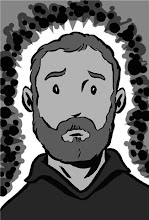 Recently my partner-in-crime David Miles Golding and I collaborated on a one-off publication for San Diego Comic Con. Entitled Tales of Dynamic Adventure, it showcases not only Dave's incredible artwork with a fabulous collection of sketches, but also two short comics drawn by Dave and written by yours truly.
Recently my partner-in-crime David Miles Golding and I collaborated on a one-off publication for San Diego Comic Con. Entitled Tales of Dynamic Adventure, it showcases not only Dave's incredible artwork with a fabulous collection of sketches, but also two short comics drawn by Dave and written by yours truly.
By chance Ain't It Cool News got hold of a copy. Their subsequent review, as seen on their world-famous website, went a lot like this:-
"Those of you lucky enough to pick up this little ditty at SDCC this year know what I mean when I say that the artist & writer featured in this book are definitely going places. This is more of a sketchbook with two short storiesIf you'd like your very own copy of the limited edition Tales of Dynamic Adventure then please don't hesitate to e-mail me for details. Each and every one will include a unique sketch of any character of your choosing by Dave. You won't be disappointed. Just ask Ain't It Cool News...
than anything, but it is a perfect sample of the awesome talent of the gentlemen who put this book together.
Artist David Golding, who I’ve seen mature into an amazing artist in Dare Comics’ THE HUNTER and STARMAKER LEVIATHAN books shows here with his “Pardus: The Last of the Leopard Men” strip that he can do pulp just as well as he can do the cosmic. Pardus is an amazing jungle man character and this short story is overflowing with teeth-gnashing action and art that pops off the page and slaps you in the face. “Legendary Gods” written by Paul Mathews and drawn by Golding is a Kirby-ian tale of a cosmic conqueror in search of a world to overthrow. This book is old school comic booking and those who love those old NEW GODS and other Kirby greats will love all of the winks and nods to this type of story. There’s even a very cool TWILIGHT ZONE-like twist at the end which caused me to chuckle.
The rest of the book serves as a sampler of sorts with many character designs and pin-ups by Golding. Some we see the evolution of both the character and the artist’s style through the years. I fully believe that in the coming years, we’re going to be seeing a lot of David Golding’s stuff. The pages in this book look simply outstanding. "

If you have enjoyed this blog, please consider making a donation to my preferred charity, the Myasthenia Gravis Association. Thank you.











